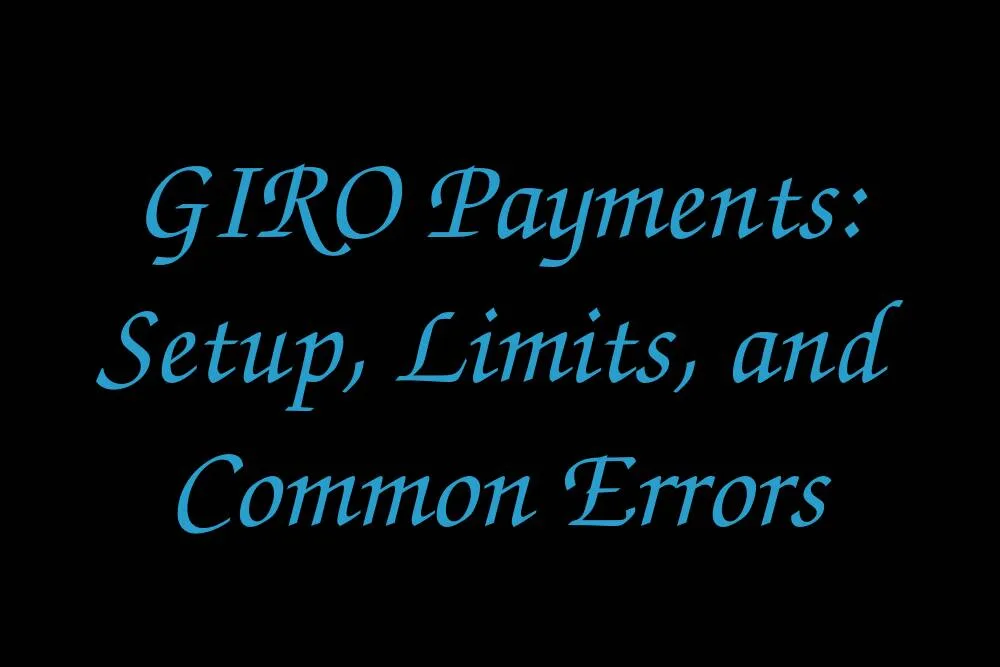Updated: September 2025 – Singapore
GIRO (Interbank GIRO) is Singapore’s widely used direct debit arrangement that lets a billing organisation (BO) collect payments from your bank account automatically on agreed dates. It is designed for predictable, low-friction domestic payments such as taxes, utilities, telecom bills, and loan instalments.
How GIRO Works
- You (the payer) authorise deductions from a specific bank account for a specific billing organisation and reference (e.g., your tax or utilities account).
- Your bank validates the mandate and processes deductions on the schedule instructed by the BO.
- The billing organisation initiates each collection based on the amount due and its published deduction date.
The Association of Banks in Singapore (ABS) publishes GIRO scheme guidelines outlining roles, onboarding, termination, and dispute procedures for banks and billing organisations.
Ways to Set Up GIRO
- eGIRO (fastest): Start on the billing organisation’s site or portal and get redirected to your bank to approve digitally. Many set-ups complete within minutes, while some public agencies note activation within up to 3 working days.
- Via your bank’s online or mobile banking: Select “GIRO services” and choose the BO from the bank’s list, then enter the exact bill reference format required.
- AXS / other online channels for agencies: Some agencies (e.g., IRAS) also support applications through AXS or their portals.
- Paper form: Still accepted by some BOs; activation typically takes longer (commonly a few weeks) as it requires manual processing.
Typical Activation Timeframes
- eGIRO: Instant to a few working days depending on the BO and bank workflow.
- Bank online application: Bank forwards your application immediately; final approval comes from the BO (often within about 14 days).
- Paper form: Commonly around 3–4 weeks at agencies that still require mailing.
Deduction Schedules (Examples)
Each BO publishes its own deduction date(s). A few common examples to illustrate how schedules are set:
- Individual Income Tax (IRAS): monthly deductions on the 6th of each month (instalments), or a one-time yearly deduction if you choose that option. If the date falls on a weekend/public holiday, deduction is on the next working day.
- Property Tax (IRAS): monthly instalment deductions on the 5th of each month.
- HDB (selected charges/loans): deductions typically on the 28th of the month; if the first attempt fails (e.g., insufficient funds), a second attempt is made on the 6th of the following month.
Important: Always check the BO’s exact schedule for your account type; the above are examples and may change.
GIRO Limits and Controls
- Per-arrangement payment cap: Many banks let you set a maximum amount per GIRO arrangement. If you prefer no cap, some banks let you specify “0” as “no limit”.
- Updates take effect quickly: At certain banks, GIRO limit changes take effect immediately once submitted (subject to daily change limits per arrangement).
- Bank charges on failed deductions: Some BOs note that banks may impose charges if a deduction fails; keep sufficient funds to avoid fees and plan cancellations.
Common Application Mistakes
- Wrong bill reference format: Many BOs require specific reference patterns (e.g., exact digits, prefixes). Using the wrong format leads to rejections or delays.
- Missing/incorrect account owner details or signatures (paper forms): Unclear signatures, uncountersigned amendments, or mismatched names can cause rejection.
- Approval still “In Progress”: If your bank/BO is reviewing your eGIRO submission, allow their stated processing time before retrying.
Common Deduction Errors & Quick Fixes
- Insufficient funds: Maintain funds ahead of the deduction date (some agencies advise funds by early evening one working day before). If a deduction fails repeatedly, some agencies suspend or cancel the plan until you clear arrears.
- Payment limit too low: If you set a cap per arrangement, increase it before the deduction date so the full amount can be collected.
- Arrangement expired or terminated: Check if the mandate had an end date, the linked account was closed, or the arrangement was terminated after multiple failed attempts.
- Cut-off or maintenance windows: Certain bank services (e.g., terminating or editing GIRO) operate only during specific hours; try again within service hours.
- Weekend/public holiday shift: If the scheduled date falls on a non-business day, the debit generally moves to the next working day.
Best-Practice Checklist
- Use eGIRO where available for the fastest activation.
- Copy the bill reference exactly as published by your BO.
- Keep enough balance before the scheduled date; consider a small buffer.
- Set a sensible per-arrangement limit and adjust it if your bill changes.
- Monitor status after applying—Approved, Active, or In Progress.
- If a deduction fails, clear the amount promptly via alternative methods to prevent suspension and late charges, then fix the root cause (funds/limit).
Amendments and Termination
You can usually view and manage your active arrangements inside your bank’s GIRO/Payments section (e.g., change the per-arrangement limit or terminate an arrangement). Some banks restrict updates to once per day per arrangement and may limit service hours for certain actions. If your GIRO is for a government agency (e.g., IRAS, HDB), check the agency’s guidance on pauses, retries, and reinstatement after failed deductions.
Important Notice
This article is for general information only. Before acting, always confirm deduction dates, processing times, and limit rules on the official pages linked below, as banks and agencies may update their policies without notice.
Official References
- ABS – GIRO scheme overview & guidelines
- IRAS – GIRO for Individual Income Tax (dates, setup, management)
- IRAS – GIRO for Property Tax (deduction on the 5th)
- IRAS – GIRO Application (eGIRO & forms; typical timelines)
- IRAS – eGIRO quick guide (AXS/online; setup within days)
- DBS – GIRO FAQs (processing & charges)
- DBS – Update GIRO payment limit (rules & “0” as no limit)
- DBS/POSB – Participating BOs & reference formats
- OCBC – GIRO Help & Support (status, turnaround)
- OCBC – Step-by-step: Set up GIRO (mobile & desktop)
- OCBC – Bill reference number format guide (examples)
- HDB – Mode of Payment (28th deduction; 6th retry)
- Singapore Customs – Apply for Inter-Bank GIRO (paper form timelines)
- MOM – Unsuccessful GIRO deduction (reasons & steps)
- IRAS – GIRO deduction attempts & cancellation after failures





